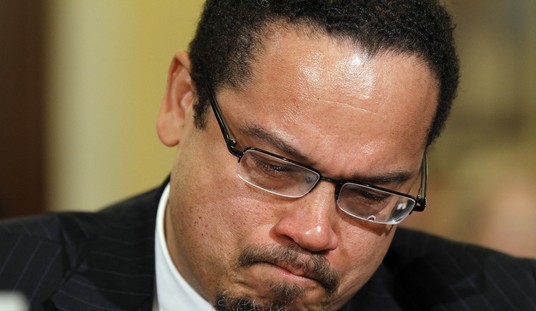“Absent reform, government programs designed in the middle of the 20th century cannot fulfill their promises in the 21st century. It is a mathematical and demographic impossibility. And we said so.
“We assumed there would be some who would distort for political gain our efforts to preserve programs like Medicare. Having been featured in an attack ad literally throwing an elderly woman off a cliff, I can confirm that those assumptions were on the mark…
“The president’s budget gives more power to unelected bureaucrats, takes more from hard-working taxpayers to fuel the expansion of government, and commits our nation to a future of debt and decline.
“The contrast with our budget couldn’t be clearer: We put our trust in citizens, not government. Our budget returns power to individuals, families and communities. It draws inspiration from the Founders’ belief that all people are born with an unalienable right to the pursuit of happiness. Protecting this right means trusting citizens, not nameless government officials, to decide what is in their best interests and make the right choice about our nation’s future.”
“Mr. Ryan proposes a budget path that would leave government unable to fulfill essential functions. As the Congressional Budget Office’s analysis finds, by 2050 his budget would reduce federal spending for everything besides Social Security, health programs and interest payments to less than 4 percent of the gross domestic product, down from 12.5 percent in 2011. Since, as the CBO notes, ‘spending for defense alone has not been lower than 3 percent of GDP’ since World War II, and Mr. Ryan wants to increase defense spending, there would be essentially nothing left for the rest of government — nothing for education, for highways, for veterans, for low-income families, for the FBI.
“Even in the short term, the Ryan cuts would be breathtaking. He would impose spending caps that would reduce domestic discretionary spending by $800 billion more over the next 10 years than the cuts agreed to as part of the debt-ceiling deal. Mr. Ryan argues that he would strengthen the safety net by transforming programs such as Medicaid and food stamps into block grants for the states. But the plan would cut Medicaid funding by one-fifth over the next decade, not to mention repealing the new health-care law’s expansion of Medicaid to those slightly above the poverty level.
“Mr. Ryan is right about the risks posed by the nation’s mounting debt. But we think his lopsided approach is dangerously wrong for the country.”
“Democrats are organizing media blitzes, House floor speeches and town halls back home to seize on the changes to Medicare that Republicans are expected to propose Tuesday. To blunt GOP talking points that only Republicans are willing to confront the debt, Democrats intend to unveil their own budget next week calling for a mix of spending cuts and tax hikes on the rich…
“‘They can run, but they cannot hide from their Medicare plan, which ends the Medicare guarantee at the same time they’re providing big new tax breaks to millionaires and protecting special interest tax loopholes,’ Rep. Chris Van Hollen (D-Md.) told POLITICO in an interview Monday…
“‘For the next few days, all our focus is going to be on Medicare,’ said a senior Democratic aide, who added that no Democrats were expected to support the House Republican budget when it heads to the floor for a vote next week.”
“The debut of the House Budget Committee chairman’s vision for what conservative governance could and should look like might win him kudos from the conservative policy class, but it elicits only groans from GOP political professionals.
“‘As a campaign issue, the budget is a significant challenge for GOP candidates,’ said Bob Honold, a GOP strategist and partner at Revolution Agency. ‘As a campaign strategy, it is so much more difficult for Republicans to communicate their responsible solutions than it is for Democrats to spook seniors with rhetoric.’
“Another senior GOP strategist was far more blunt. ‘Didn’t they learn their lesson?’ the source asked. ‘House Republicans are still under the mistaken impression they have to lead. It’s a presidential election year; they’re along for the ride.'”
“Most important, this budget tests Ryan’s reputation as a fiscal hawk, especially his tax plan. The latter would reduce the individual tax rates (which make up the majority of government revenue) to two brackets of 10 percent and 25 percent, while lowering the corporate tax rate to 25 percent. The Joint Committee on Taxation released a report last October saying that it would be hard to reduce the corporate tax rate to anything lower than 28 percent without losing money. Ryan’s plan would also create a territorial tax system that would offer a low tax rate, if any taxes, on the profit that U.S. companies earn overseas–a page from the playbook of the Ways and Means Committee Chairman Dave Camp, who introduced a similar international tax plan last fall.
“To pay for these tax cuts, Ryan says that his budget would close tax loopholes–a political dodge both parties lean on heavily when talking taxes. But for an economic nerd like Ryan, the dodge does not come across well. Which loopholes? Would it be the wildly popular mortgage-interest deduction that encourages millions of Americans to buy homes, or the tax break that goes to employers that offer health care? And which segment of the population would bear the brunt of the elimination of certain tax breaks–the middle class, the poor, or the wealthy?”
“With the House set to engage in another vicious fight over today’s new 2013 budget proposal by Rep. Paul Ryan, R-Wis., we are witnessing once again a phenomenon that’s been apparent since the 2010 election: the tea party movement still holds the commanding heights of American politics. It is still setting the agenda for national debate. It wants what it wants. And it doesn’t much care what anyone in either the GOP or Democratic Party thinks about it…
“Fault them if you will as a band of primitivist monomaniacs, question whether they are sincere enough to surrender their own Social Security and Medicare as well as everyone else’s, but the tea partiers are not going to fade away. They clearly represent a deep and abiding — and perhaps last-ditch– movement of resistance to the indomitable tendency of American government to grow ever larger. They know that the various eruptions of conservative rebellion since the Reagan era, including the Gingrich-led takeover of the House in 1994, each amounted to little more than one step forward, two steps back. They know that George W. Bush blew the budget out entirely. And they know that none of the GOP candidates, ‘establishment’ or not, is delivering up the answer they want. Except maybe for Ron Paul, which accounts for his rise from the fringes…
“Like them or not, they’re not going away, no matter who wins in November.”
“The reaction to Ryan’s tax plan will be the truly telling thing. He proposes to create two relatively low tax brackets but to do so in a way that achieves revenue neutrality by eliminating most deductions and exclusions. Almost certainly this will mean reducing or eliminating the mortgage-interest deduction, deductions for state and local taxes, and deductions for charitable giving. (Ramesh’s beloved child tax credit probably will survive, unfortunately.) The Committee to Reinflate the Bubble will fight tooth and talon to defend the mortgage-interest deduction, and they’ll have a great many middle-class homeowners behind them.
“Politicians in both parties (and many of my colleagues at this magazine) speak constantly of defending the interests of the middle class, but it is precisely the middle class that will have to see higher taxes or lower benefits or both if the country is to remain solvent. We could tax the rich at 100 percent and still fail to balance the budget, and the Bush tax cuts for the $200,000-and-up set are dwarfed by the Bush tax cuts for the middle class. Meanwhile, more than two-thirds of federal transfer payments go to the non-poor, mainly to the middle class. It is the middle class, not the wealthy, that enjoys relatively light taxation.
“Some generations have to storm Normandy, some have to give up tax-code housing welfare for relatively well-off homeowners. Watch your back, Mr. Chairman.”
“I’m very supportive of the Ryan budget plan. It’s a bold and exciting effort on his part and on the part of the Republicans and it’s very much consistent with what I put out earlier. I think it’s amazing that we have a president who three and a half years in still hasn’t put a proposal out that deals with entitlements. This president’s dealing with entitlement reform — excuse me — this budget deals with entitlement reform, tax policy, which as you know is very similar to the one that I put out and efforts to reign in excessive spending. I applaud it. It’s an excellent piece of work and very much needed.”
“‘We do believe that our nominee, whoever this person is going to be, is going to be perfectly consistent with this,’ Ryan told reporters as he unveiled his Road to Prosperity budget. ‘I’ve spoken to all of these guys – and they believe that we are heading in the right direction.’…
“‘Our nominee owes it to the country to give them a choice of two futures,’ Ryan said. ‘We’re helping him do that.'”
Click the image to listen.








Join the conversation as a VIP Member